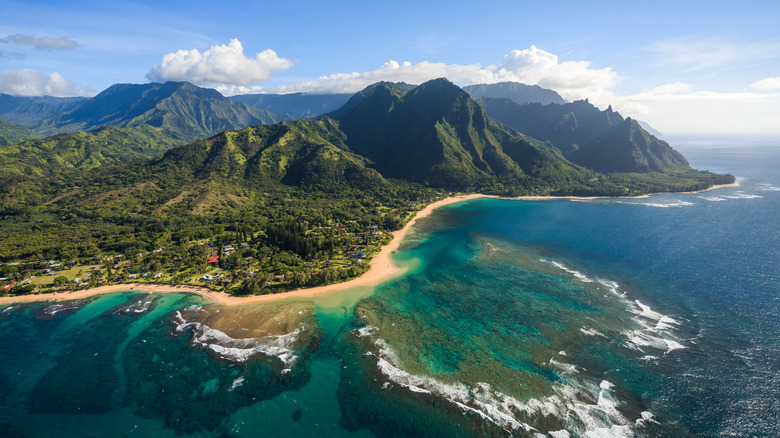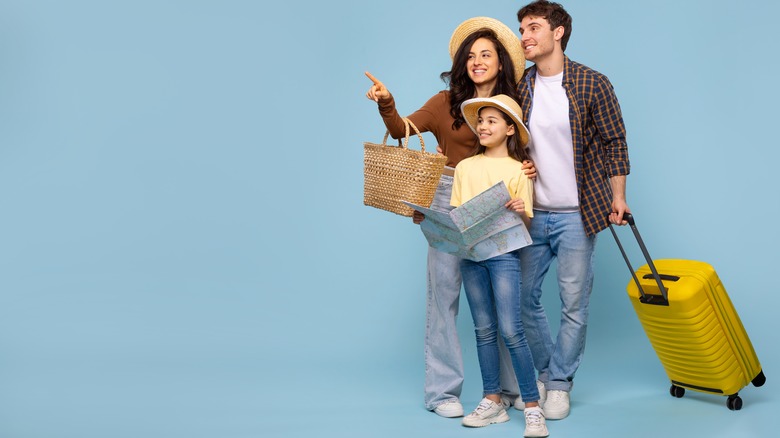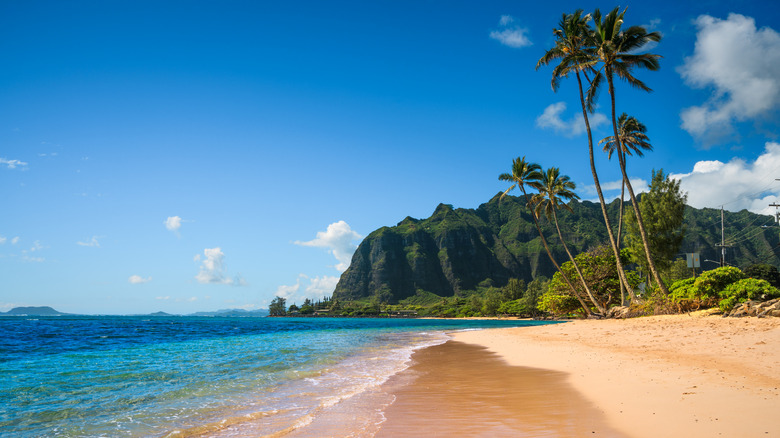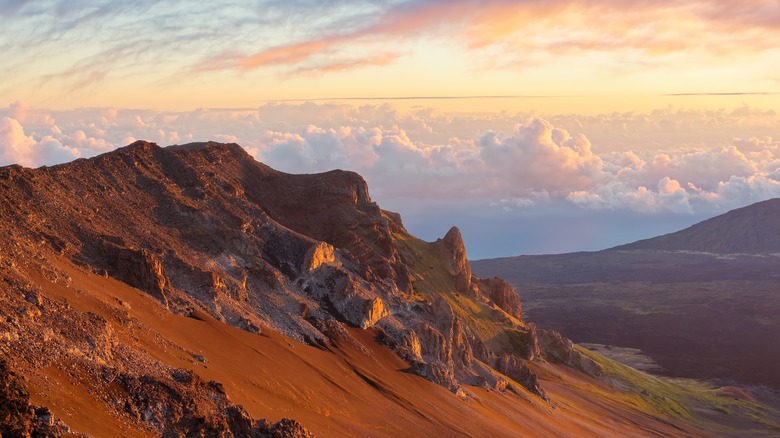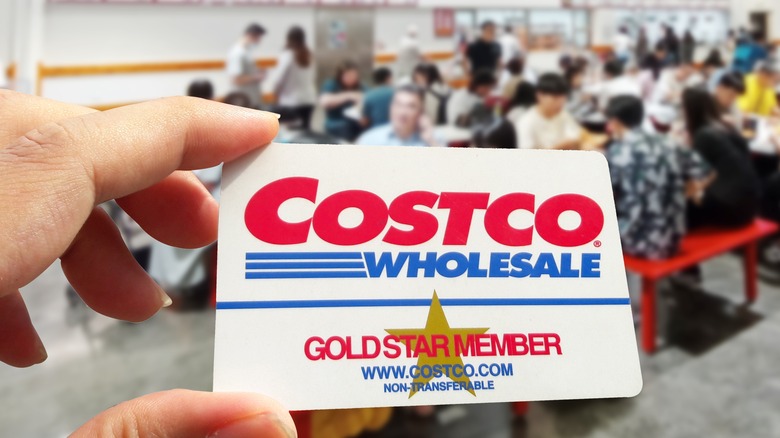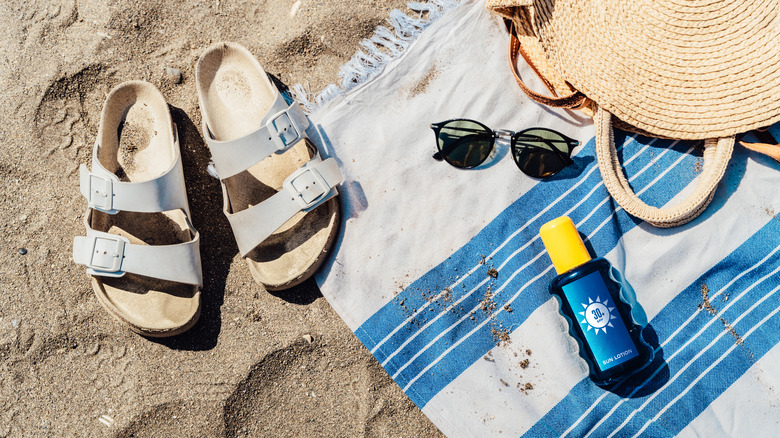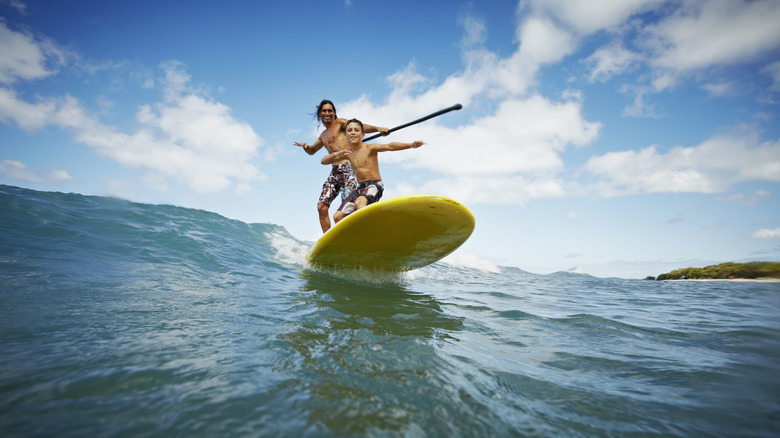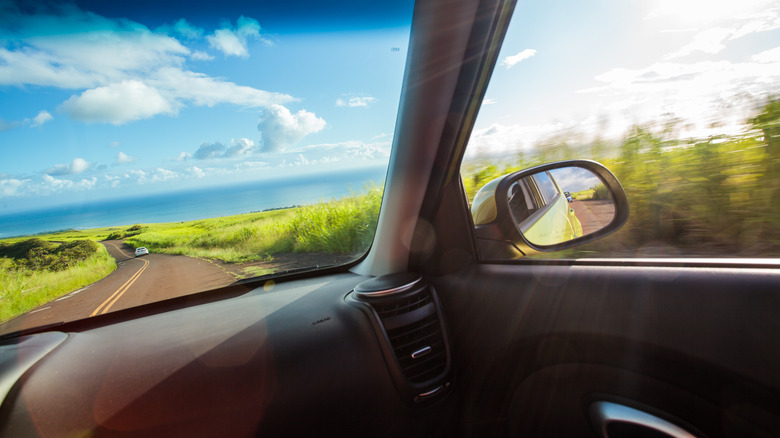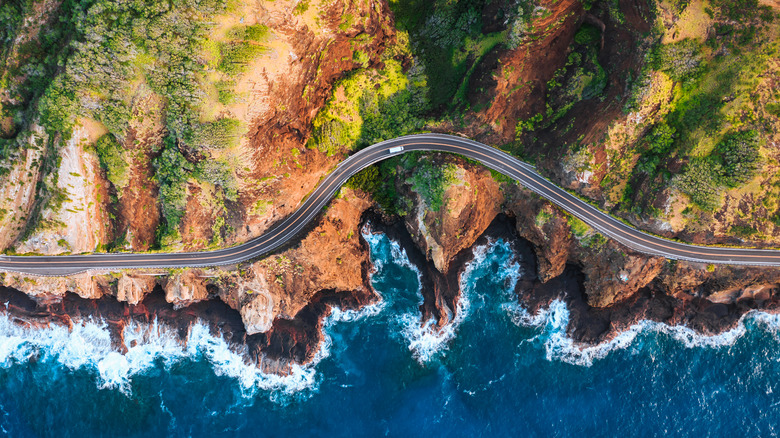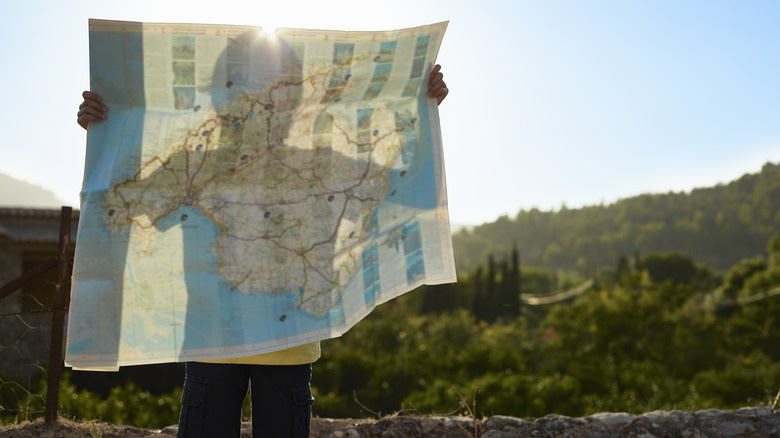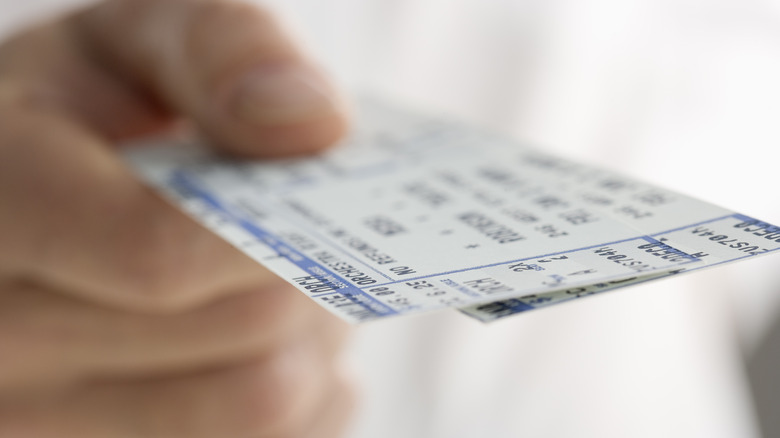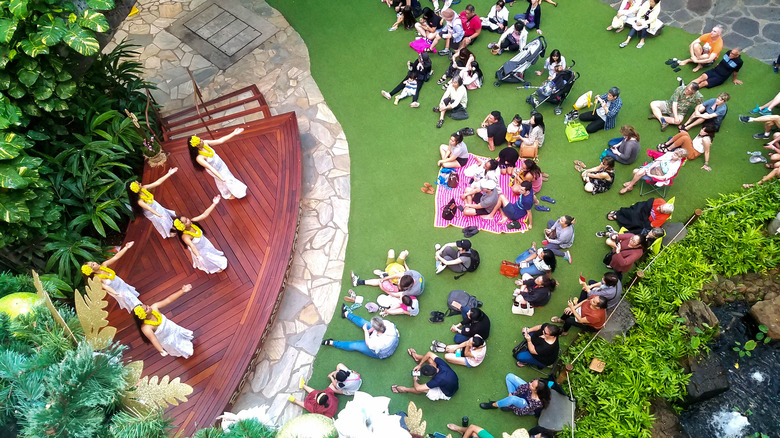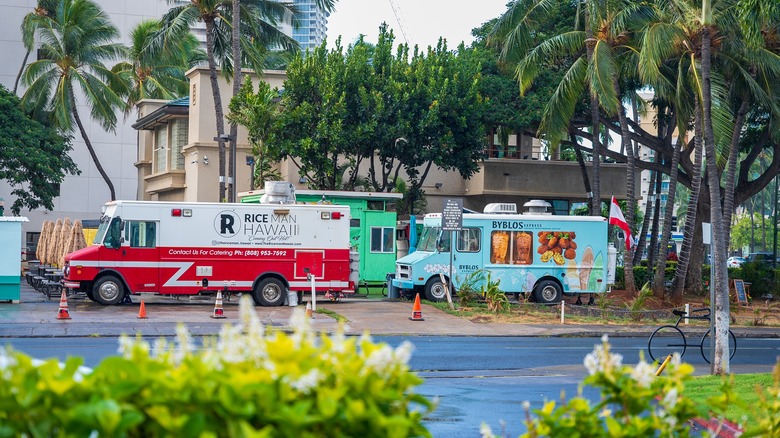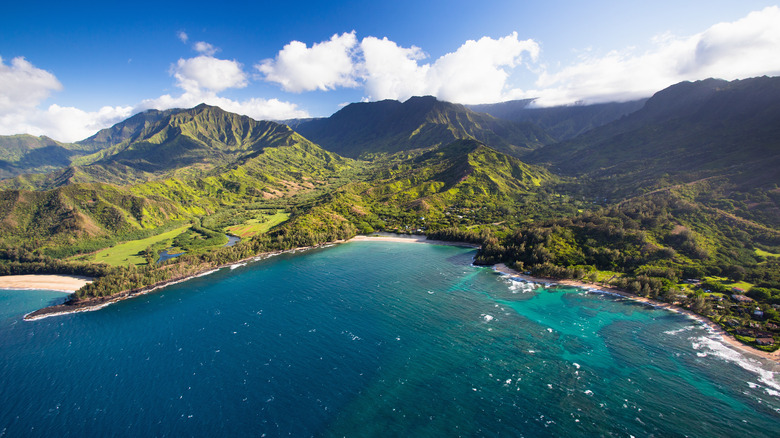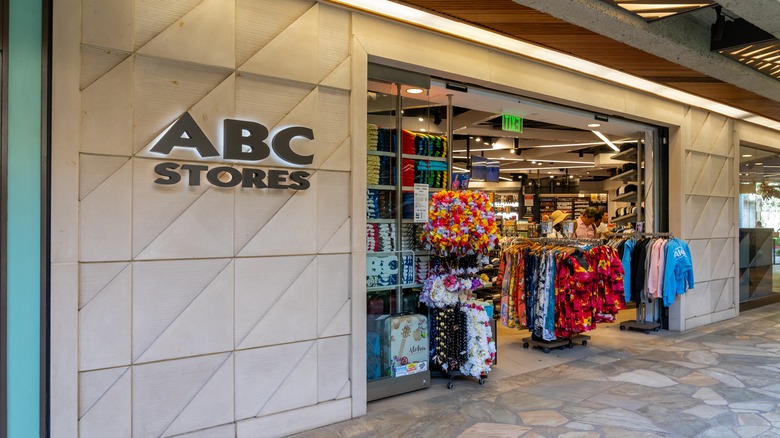15 Essential Travel Hacks When Visiting Hawaii, According To An Expert
A visit to Hawaii is a magical experience. Travelers who have explored the volcanic archipelago come away with stories of majestic hikes through ancient forests and more than a few tales of iconic beach scenes. The islands contain many marvelous cultural and natural gems, and even corporate enterprises participate in the quirkiness and unique spirit of the community. A great example is the 3-acre plant maze at the Dole plantation, which is one of many bizarre road attractions in America.
Planning a trip to this far-flung Pacific island state is often an exercise in patience and plenty of conversation. Building the financial reserves to afford the expensive airfare and hotel alone can be a tall task. This gives travelers many months (or even years) to mold the perfect holiday to America's most popular domestic vacation destination. This also affords planners the ability to uncover and benefit from all manner of travel hacks and strategies to maximize their trip and even shrink their budget requirements.
We spoke with Victoria Derrick, the president and co-owner of HawaiiGuide.com, to get the inside scoop on vacation travel to the islands. Derrick is an expert on travel to and throughout Hawaii. Some of her most compelling words of wisdom can transform your vacation, giving you ideas for saving money and helping you pack for the greatest excitement possible on your adventure. These are Derrick's 15 essential travel hacks that can help anyone planning a visit to Hawaii make the most of their trip.
Use loyalty programs and travel rewards points
Derrick strongly advocates using travel rewards tools. "Travelers can enjoy Hawaii's beauty without breaking the bank by planning strategically and taking advantage of these cost-saving measures." When you visit Hawaii, you're guaranteed to be looking at a significant commitment to air travel. Even the shortest flights from the mainland require over five hours to make the journey. Coupled with the destination's vaunted status as a vacationer's paradise, flying to any Hawaiian island comes with a pretty hefty price tag, even at the best of times. So, "if you have travel rewards or frequent flyer miles, use them to offset flight costs."
Hotel rewards tools can also factor into the picture here. Derrick notes, "Redeeming loyalty points for free or discounted stays can significantly reduce accommodation expenses." Anything you can do to shave away or even eliminate these two primary budgeting factors will drastically improve the experience you can create when visiting Hawaii. Leaving more room for cultural experiences, food, and day trips will amplify the fun.
Consider traveling during the shoulder season
Seasonality is a big deal when planning a Hawaiian getaway. Derrick advises planners to steer clear of peak seasons. "Hawaii's busiest and most expensive times are during summer (June to August) and holidays (Christmas, New Year, and spring break)," she warns. Instead, she suggests that travelers consider shoulder seasons or off-peak times. Traveling in April or May or later in the year between September and October offers "good weather at a fraction of peak season costs," she suggests.
Going for a vacation totally off-peak in Hawaii is also an option (and don't forget the value of flying on a weekday, particularly on a Tuesday). The climate remains mild and comfortable, but flights, accommodation costs, and the crowds at major attractions across the state's islands are all reduced significantly. If you're seeking good value on your trip to maximize the experience, off-peak vacations during the shoulder season are your best friend. Here's your guide to getting the cheapest flight for any trip.
Don't sleep on Hawaii's plethora of free and low-cost activities
Plenty of activities across the islands cost money. Numerous Hawaiian cultural staples are often part of tours and paid experiences. But Derrick suggests seeking a few additional activities that won't cost you anything or very little. "Many state parks and hiking trails are free or have a minimal entrance fee. Sites like Waimea Valley, Diamond Head, and Haleakala [the national park inside a crater of a volcano] are accessible at a fraction of the cost of organized tours." Similarly, entry to Pearl Harbor's USS Arizona Memorial is free when you reserve a ticket in advance.
Additionally, local festivals and farmers' markets offer a taste of Hawaiian culture for free or massively reduced prices compared to the tourist-tailored exhibitions and shows that often stand out in advertised activities at hotels. Beach days are also a great option, naturally. "Hawaii's beaches are accessible, and there's no shortage of stunning spots to relax, swim, or snorkel," she adds. Still, you should watch out for hidden expenses during your Hawaii trip.
Bring your Costco card along for the journey
Beyond the perks of your travel rewards credit card or airline and hotel membership accounts, visitors to the Hawaiian Islands might be surprised to find that memberships in other discount clubs can also come in handy. Your Costco membership, for instance, can unlock significant discounts on necessities. It's one of the most underrated travel tips the Hawaii travel expert offers.
Derrick details: "If you're a Costco member, Hawaii's Costcos offer significant savings on gas, groceries, and even activities like helicopter tours or luau tickets. You can also get discounted gift cards for popular restaurants and excursions." Renting a car or taking a helicopter tour of the region's volcanic activity can be made less expensive with your Costco membership. And for those who don't have one already, it might even be worth signing up to lock in a few crucial discounts on your adventure, even if you never actually head into your local Costco to do any shopping.
Pack reef-safe sunscreen, and don't forget aloe vera gel
Inevitably, you'll be itching to get into the clear blue waters that surround whatever island you've chosen as a holiday destination. However, Derrick cautions travelers regarding a common mistake. Plenty of vacationers heading to beach destinations will pack their favorite sunscreen brand, reckoning that bringing a tube from home will save them some money when they arrive in the tourist hotspot they've chosen. This logic is sound, but Derrick explains, "Hawaii bans sunscreens with chemicals harmful to coral reefs, such as oxybenzone and octinoxate."
Any sunblock containing chemicals can harm the marine wildlife you want to interact with. Instead, "pack reef-safe sunscreen, or you'll need to buy it locally, which can be expensive," she says. Since Hawaiian visitors will need specific skin protection when entering the water, it naturally comes at a premium if you have to buy it on the islands.
Pack a few essentials
A trip to Hawaii isn't complete without a compulsory voyage into the islands' forested areas and numerous treks along the shoreline. There's so much foliage and spectacular views to take in that visitors often eagerly work to find room in their schedule and budget to return. Whether you're a first-time visitor to one of Hawaii's spectacular islands or a repeat explorer, packing a few crucial pieces of gear will help make these treks into the wilds of the island ecosystem even more enjoyable.
"Many beaches in Hawaii have rocky shorelines, so water shoes can protect your feet while exploring tide pools or waterfalls," Derrick notes. A dry bag is also a good option "if you plan to do any water activities, such as kayaking, stand-up paddleboarding, or boating." Lastly, compact binoculars can improve many activities, from whale watching to stargazing. They're also a great addition to your day pack when exploring mountaintop destinations like Haleakalā or Mauna Kea.
If you're renting a car, consider targeting specific days rather than the duration of your trip
Public transportation is pretty accessible on many islands. It can be a little slow at times, especially during peak travel times. As well, bus routes won't cover more remote tourist destinations, leaving you to require alternative transportation in some instances. For this, many travelers will consider renting a car. The easiest way to accomplish this feat is to get the vehicle upon arrival at the airport and return it on your last day. But Derrick advises against this. Renting from the airport is often more expensive than procuring your rental car from a company office in town. However, she also notes that skipping days is a great budgeting strategy.
"Many visitors assume they need a rental car for their entire stay," she says, but this isn't necessary for many Hawaiian Islands. Oahu, for instance, is a great place to walk or bike, and public transportation is quite comprehensive in most developed areas. Similarly, "if you stay in Waikiki or downtown Honolulu, everything is accessible by foot, and for day trips, you can rent a car just for that day." Breaking up car rentals keeps you from finding a place to park the vehicle (and paying a hefty price for the spot) and can significantly improve your vacation budget.
Don't forget to explore some of Hawaii's most scenic roads
If you are renting a car when you land on one of Hawaii's islands, you'll want to take full advantage of the tool. For many visitors, this means not only driving out to tourist destinations that aren't well served (or covered at all) by local bus routes but also enjoying the road itself. Derrick suggests a few key scenic drives that should be high on your list.
The road to Hana on Maui is "a full-day journey filled with waterfalls, beaches, and lush scenery," while the Waimea Canyon Drive on Kauai is "known as the Grand Canyon of the Pacific," and "offers stunning lookouts" all along the route. The Haleakalā drive is another that's certainly worth exploring. However, Derrick suggests that you ensure "your vehicle can handle steep roads and bring layers for cold weather at the top." This drive is particularly awe-inspiring since a trip up to the summit is often timed with the sunrise or sunset to really make the journey special.
Download offline maps to maintain your bearings
The Hawaiian Islands are exceedingly remote. There's not much around them in any direction, and even though the community is part of the United States, it's so far from the mainland that certain things that might be taken for granted by other Americans are a bit scarcer here. One feature of modern living that most Americans won't typically think of is cellular service. Coverage in the mainland is pretty comprehensive in just about any area with a notable human population. But on the Hawaiian Islands, "cellular service can be spotty in some remote areas," Derrick warns.
You may be driving along a scenic coastal route only to find that your coverage has dropped and the GPS no longer knows where you are. The same can be said for hikers utilizing their phones to help navigate back to the car after a trek. To remedy this issue, Derrick says to "download offline maps through Google Maps or use a GPS app to help navigate, especially on longer drives like the Road to Hana or around the Big Island." She also notes that offline GPS apps sometimes include "insider tips, free attraction details, and history lessons without paying for a guided tour."
Make reservations in advance whenever you can
Sites like the USS Arizona are free if you reserve your visit in advance. Similar benefits come from other advanced planning when visiting Hawaii. Derrick suggests working around your biggest ticket items to plan a full schedule of events on your vacation (depending on how busy you want to be). "Many major tourist attractions, such as Pearl Harbor, Diamond Head, and Hanauma Bay, are easily accessible by public transportation on Oahu," she notes. However, other sites are not, so you'll need to work out transportation as well as entry tickets when visiting. Renting a car, booking a tour spot, or exploring Uber or Lyft options can all be helpful.
"Some hotels offer free shuttles to popular tourist spots or shopping centers, especially in Waikiki or resort areas on Maui," she adds. This can alleviate some transportation planning. She also suggests reserving a car as early as possible if you're planning to rent one: "Hawaii's rental cars can sell out quickly, and last-minute rentals are often more expensive."
Take hydration seriously
Hawaii is an outdoor paradise. You'll likely spend most of your time exploring the natural environment in some way or another while on its islands. That might mean swimming in the ocean or hiking in its forests. No matter what kind of adventure you're hoping to find on a Hawaiian getaway, spending that much time outside in the sun means you'll need to drink plenty of water to stay hydrated. Derrick suggests travelers use reusable water bottles and hydration backpacks for a clean and better experience.
If you plan on hiking while on vacation, "a hydration backpack with a built-in water reservoir can be a lifesaver on long trails," she says. The last thing you'll want to deal with when relaxing by the pool or sitting down at the end of a long day filled with adventures is dehydration symptoms. This comes along with headaches and plenty of other ailments that will take away from the experience. Drink plenty of water, and your trip will be enjoyable, not strenuous.
Head to a nearby shopping center for free cultural performances
Derrick reveals an important secret about holiday planning in Hawaii that many visitors aren't likely to know about. You won't necessarily need to spend exorbitant amounts of money to enjoy a Hawaiian cultural performance, like seeing a hula show or listening to traditional Hawaiian music. "Many shopping centers, like Ala Moana Center on Oahu or Whalers Village on Maui, offer free daily cultural performances, including hula shows, live music, and craft demonstrations. These performances provide authentic Hawaiian culture without the expense of tickets."
This can be a lifesaver for travelers looking to multitask. If you need to do a little bit of shopping for snacks, essentials like a sarong or sunscreen, or souvenirs, catching a free show while you're out and about can make it all the more worthwhile. Many shopping centers offer really good entertainment in an authentic setting beyond the touristy hubbub of an overproduced alternative.
Head to the food trucks and farmers' markets for authentic, local eats
As a distant island many hours from the mainland, Hawaii is an eclectic blend of local goods, produce, and imported additions. Anything from the mainland is naturally less fresh than food harvested, caught, or raised on the islands. Goods that have been flown in are often more expensive, too.
Derrick suggests looking out for food trucks and farmers' markets to help reduce the price of daily meals. It's also a way to bring yourself closer to the authentic, local produce that Hawaiians rely on and create. "Hawaii's farmers' markets are great for finding fresh, local produce and offer prepared foods like poke bowls, fresh fruit smoothies, and baked goods at lower prices than restaurants. Plus, you get to try authentic local ingredients," the expert notes. "Food trucks are "a more affordable way to experience local flavors than high-end restaurants."
Look into package deals for the best bargains
Package deals are a great way to combine elements of your itinerary, sometimes netting significant discounts on the total price. Derrick suggests looking into packages that bundle flights and hotels, as well as rental car packages that add a car to other parts of your vacation planning. She also suggests searching for activity bundles: "package deals that include tours, activities, or attraction tickets."
You might want to see a hula show, explore the Big Island's volcanoes by helicopter, and take surfing lessons. All three activities might be available as a bundle deal from your hotel or through a tour operator nearby. It's worth looking into bundles that can save you money, especially when it comes to some of the pricier elements of your trip, such as your hotel stay or adventure activities like a series of scuba dives. A night dive off the coast of Kona, for instance, ranks just below some of the most exciting and dangerous dive opportunities the world over.
Shop for souvenirs at ABC Stores
Souvenir shopping is a part of the experience when it comes to a Hawaiian vacation. Items like a cheap ukulele are among the souvenirs you should skip when visiting Hawaii. However, Derrick goes a step further and offers a valuable alternative to the price-gouging souvenir stalls in tourist areas. She tells visitors to head into one of Hawaii's ABC Stores when looking for gifts to bring home as mementos or for loved ones.
ABC Stores are found all over Hawaii, and they "offer affordable souvenirs, snacks, and beach gear at lower prices than tourist shops. Stock up on locally made products, snacks, and even basic groceries like water and sunscreen to avoid higher hotel shop prices," she advises. Locally made souvenirs are more environmentally friendly, help support the local community, and are often better quality than cheap knock-offs that come from elsewhere. Shopping for a few gifts in a local outlet like this is a final salute to the islands as you prepare to return to the hustle and bustle of your routine.
